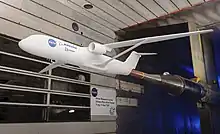
Boeing Truss-Braced Wing are airliner designs studied by Boeing with braced, high aspect ratio wings.
SUGAR Volt

SUGAR Volt is the hybrid aircraft concept proposed by a team led by Boeing's Research & Technology division. It is one of a series of concepts put forward in response to a request for proposals for future aircraft issued by NASA. It is proposed that SUGAR Volt would use two hybrid turbofans that burn conventional jet fuel when taking off, then use electric motors to power the engines while flying. SUGAR stands for Subsonic Ultragreen Aircraft Research; "Volt" suggests that it would be at least partly powered by electricity.
SUGAR Volt would have emissions about 70 percent lower than average airliners today. Noise pollution will also be lower than airliners today. This hybrid-electric approach however remains to be balanced against increased complexity, large electric engine and battery size and weight. Relying partly on electric power might reduce specific fuel consumption (SFC) compared to a standard turbine-only design (turbofan or lower-consumption turboprops).
SUGAR Volt is designed with a long, braced, high aspect ratio wing that decreases induced drag due to lift. The wings of SUGAR Volt would enable it to take off in a shorter distance and generate less noise. The outer wings of the SUGAR Volt should fold to save ground space, increasing weight.
Transonic truss-braced wing
Using a shortened MD-90 airframe, a full-scale Sustainable Flight Demonstrator (SFD), designated the X-66A, should fly in 2028, outlining a possible family of 130-to-210-seat aircraft.[1] The full-scale Sustainable Flight Demonstrator (SFD) is designated the X-66A.[2][3]
See also
References
- ↑ Graham Warwick (January 18, 2023). "NASA Picks Boeing's Transonic Truss-Based Wing For Sustainable X-Plane". Aivation Week.
- ↑ O’Shea, Claire (2023-06-12). "Next Generation Experimental Aircraft Becomes NASA's Newest X-Plane". NASA. Retrieved 2023-06-13.
- ↑ "USAF Designates NASA Demo X-Plane X-66A". Aviationweek.com. June 13, 2023. Retrieved June 13, 2023.
External links
- "Boeing producing battery-powered hybrid plane". Northwest Cable News. August 2, 2010. Archived from the original on January 30, 2013. Retrieved June 18, 2012.
- "Electric aircraft generates buzz at Oshkosh air show". Chicago Tribune. August 1, 2010.
- "Air show examines hybrid airliners". United Press. Aug 2, 2010.
- "NASA, Boeing Test Low-Drag Truss-Braced Wing Concept: High-aspect-ratio, truss-braced wing promises marked fuel savings". Aviation Week & Space Technology. Aviation Week Network. January 27, 2014. Retrieved 10 January 2019.
- Warwick, Graham (January 28, 2014). "Will Boeing Embrace Braced Wings?". Things with Wings Blog. Aviation Week Network. Retrieved 10 January 2019.
- Bradley, Marty (August 2017). "How sweet the future of aviation: An informal brainstorm turns into potential climate-saving flight technologies". Innovation Quarterly. Boeing.
- Droney, Christopher (August 2017). "SUGAR sweetens the deal with Phase 3 results, Phase 4 underway". Innovation Quarterly. Boeing.
- Eric Ting; Kevin W. Reynolds; Nhan T. Nguyen; Joseph Totah (2014). Aerodynamic Analysis of the Truss-Braced Wing Aircraft Using Vortex-Lattice Superposition Approach (PDF). 32nd AIAA Applied Aerodynamics Conference. NASA Technical Reports Server.